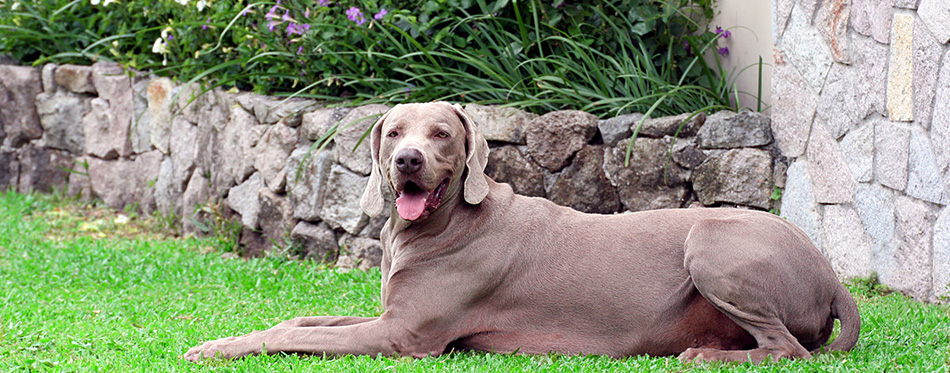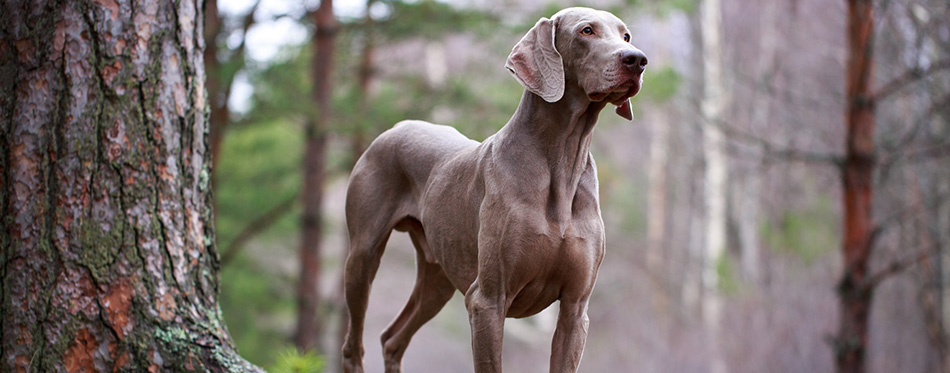The Weimaraner is an instantly recognizable dog because of its unique coat color and athletic appearance. Perhaps unsurprisingly, the Weim was in fact a hunting dog originally which results in its highly active and athletic nature. It can sometimes be stubborn to train but this doesn’t matter that much as this dog is a very smart, loving and loyal companion. So, whether you’re looking for a new running buddy or simply a friendly companion, the Weimaraner might be the perfect choice for you. In this article we’ll cover the main aspects of dog care you’ll need to know before choosing to adopt or buy this precious pup.

History of the Weimaraner
Despite the breed’s popularity across the world, the Weimaraner is a fairly recent breed compared to other hunting dogs. Originating in the early 19th century, the Weim was selectively bred as a hunting dog for German noblemen. This was achieved by crossing the German Shorthaired Pointer and the Red Schewisshund, along with other Pointer breeds. However, the Weim is commonly believed to have originated from the Bloodhound. Similarly to other hunting dogs from this time, the Weimaraner would have been used to help their masters hunt large game such as bears, deer, and wolves.
The breed was exclusively bred and developed by the German Weimaraner Club which prohibited non-members from buying this breed until 1929. Shortly after, the club’s rules became relaxed and two Weimaraners were then allowed to be imported to the United States by an American club member, Howard Knight. As the breed grew in popularity in the United States, it eventually received recognition by the American Kennel Club in 1943. Nowadays, the Weim is more popular and takes part in more competitions in the United States than it does in Germany.
Quick Facts About the Weimaraner
If you didn’t already know, the Weimaraner is a beautiful and fascinating dog with a sporty and lovable personality. Later in this article, we’ll cover some of the most important aspects of dog care which you should know before buying or adopting a Weim. The list below contains some of the most interesting facts about this breed, from its ‘ghostly appearance’ to its typical size and weight.
- The Weimaraner is known by a few names. The breed was originally known as the Weimer Pointer, nodding to one of its parental breeds, the German Shorthair Pointer. Other names include the Weim, or the Grey or Silver Ghost. The latter being a common nickname based on the appearance of the breed’s ghostly grey coat.
- Understandably, the Weimaraner is a large and muscular breed due to its origins as a hunting dog. In adulthood, the Weim can grow between 1 foot, 11 inches to 2 feet tall and they typically weigh around 55 to 85 pounds.
- When trained well, the Weimaraner can be the perfect family companion as they love human attention. Although, they are better suited to families with older children and not toddlers.
Things You Should Know
The Weimaraner needs lots of training which might be difficult for first time pet owners. However, for experienced pet parents this loveable pooch can make a great addition to the family. This is because the Weimaraner is naturally quite stubborn so it can be difficult to train at times, and it requires much more exercise compared to other dogs. So, while it’s generally not recommended to raise a Weim as your first dog, it can work if you’re determined, strong-willed and if you can get assistance from an experienced trainer if/when necessary.
You’ll also need to ensure that a Weimaraner suits your schedule and needs. The breed typically requires lots of attention and can severely suffer from separation anxiety if left alone for extended periods of time. During this time, the dog might show this anxious behavior through tearing or chewing things which are in its vicinity. So, you should ensure that you’ll be able to give your new pup the attention it needs (and deserves) before making the decision to buy or adopt.
We’re now going to look at some of the most important aspects of dog care that you’ll need to know about this pup. From training to feeding, healthcare to exercise, we’ve covered the most important aspects you’ll need to know before agreeing to raise a dog from this beautiful breed.
Health
Weimaraner dogs are typically healthy and are able to live a long and happy life if looked after carefully. However, like most dog breeds, the Weim isn’t excluded from health conditions and there a few which are commonly found in this breed. When buying or adopting a pup, there are a few things you can do improve your pup’s chances of growing up without medical conditions. Buying or adopting a pup from a trustworthy and reputable breeder will significantly decrease the chance of your dog inheriting a condition from its parents. This is because reputable breeders should have proof of the parent’s health, typically in the form of clearance from the Orthopedic Foundation for Animals. This organization provides clearance for conditions such as elbow and hip dysplasia, von Willebrand’s disease, and hyperthyroidism, which are all commonly found in Weimaraners.
Some other common conditions which may affect the Weimaraner include:
- Hyperthyroidism: This condition occurs when there is a deficiency of the thyroid hormone. While treatment usually must continue for the rest of the dog’s life, it is fairly easy to manage and causes little to no interruption to normal life. Symptoms to look out for include constant fatigue, lack of energy, unexplained obesity, change in appearance of the skin and coat – dryness, flakiness or color change.
- Progressive Retinal Atrophy: This eye disorder won’t be passed on under the supervision of a reputable breeder so it isn’t likely unless you’re adopting a pup with an existing condition or if you can’t trace the parent’s medical records. The condition causes sensitivity and sight problems before gradually deteriorating to complete blindness. However, this condition can be diagnosed years in advance of these symptoms. Looking after a blind dog isn’t the worst thing in the world either, not only would you be giving a poorly pup the best chance at life, but you can also expect to do most of the same activities. It takes some time to adapt and might require a few lifestyle or environmental changes but looking after a blind dog is perfectly manageable. You may also like our article on the best toys for blind dogs.
- Hemophilia: This condition prevents the blood from clotting which, in turn, affects the body’s ability to stop bleeding, heal wounds and causes bruising easily. However, the medical problem is typically inherited so buying or adopting from a trusted breeder is the best way to avoid this condition.

While it might now seem that Weimaraner is prone to several medical conditions, it’s important to know that these are simply the most common ones and that they don’t affect all pups from this breed. By buying or adopting from a respectable breeder, checking the parents for medical conditions, and continuously monitoring your precious pooch, you’ll minimize risk of them developing a condition and improve the chances of diagnosis and successful treatment.
If the Weimaraner is raised well, looked after, and given appropriate medical attention where necessary, this beautiful breed typically lives between 11 to 13 long, happy years.
Training
The Weimaraner can be difficult to house train and isn’t suited to living in an apartment due to its athletic nature and need to exercise. Crate training is recommended for this breed to ensure they adapt to their environment and become dependent. The breed has the potential to be accepting of smaller pets if it is socialized well during infancy but introducing smaller pets to the Weim isn’t wise after this period. For this reason, it’s important to socialize the Weimaraner at a young age with small pets and children to ensure they learn how to behave around other animals and people. However, the Weimaraner gets along well with older children already because of its desire for human interaction and companionship.
Since the breed has been selectively bred for its intellect, loyalty and athleticism, training is highly effective with the Weimaraner. They have an instinctive desire to learn and to please their owner. For this reason, a consistent training plan would be ideal for the Weim. It’s best to train one skill at a time, rewarding with treats for good behavior and not rewarding when they don’t do as they are instructed. Following a consistent training program will ensure your dog learns new skills effectively, improve their behavior and will ensure they are mentally stimulated.
Exercise
As you might expect with a hunting dog, the Weimaraner requires lots of vigorous exercise to keep it physically stimulated and in-shape. You’ll need to give your precious pup lots of exercise by taking them out walking or running as well as additional playtime throughout the day. Taking your Weimaraner to a dog park or a secure, fenced field is a great idea to let them roam free. However, if there are other dogs around, especially smaller dogs, you might need to keep your pup on a leash if they haven’t been socialized. It’s important that your dog is well trained particularly if you want to let them roam free without a leash. Recall, stay, and sit are skills which your dog should have mastered before letting them loose in area with other dogs, this is for the safety of your pup and others.
So, a fully grown adult Weim needs around two hours of exercise per day, usually split into a few sessions. Of course, this recommendation depends on several factors such as the specific dog’s diet, weight, age and any medical conditions. If you’re unsure about how much exercise your dog should receive, it’s best to seek professional advice from the vet.
As previously mentioned, playtime is another essential aspect of exercise which shouldn’t be overlooked. Other than normal exercise, your dog will need lots of playtime to keep them mentally stimulated and physically stimulated too. Playing with toys in the home or in the garden is the best way to keep your dog busy and is a great way for you both to bond together. Not only is this great for your dog, it’s great for you too as it allows you to have fun with your precious pup and relax after a busy day at work. Take a look at our review of interactive dog toys for more options.
Nutrition
Providing nutritional recommendations can be tough as every breed and every dog within the breed are vastly different. A dog’s diet should be based on its age, height, weight and any special requirements caused by medical conditions. These are things which you’ll have to test through trial and error and it will take some time. If you’re really unsure about how or what to feed you playful pup, seek professional advice from the veterinarian.
That being said, 2.5 to 3.5 cups of high-quality dry food should suffice for the average fully grown Weimaraner. This should be divided into 2 portions given at different times throughout the day. The dry food should be high in animal protein to reflect the dog’s natural diet and to ensure they receive the correct nutrients which sustain the physically active nature of the Weim. If your pup begins to lose or gain weight without a clear reason, try slightly increasing or decreasing the food intake respectively. Or, you could try reducing or increasing exercise time to see if this corrects your pup’s weight. If it doesn’t or if you’re concerned that a medical reason may be the cause, contact the vet immediately to seek treatment.
For more options, check out our detailed review of the Best Dog Food for Weimaraners.
Grooming
Thankfully grooming is one of the easiest aspects of dog care for this beautiful breed. Its gorgeous, short and smooth coat means that dirt isn’t usually a problem which is great considering this dog loves to explore the outdoors. To keep your pup clean simply brush them weekly to assist with shedding and to prevent rogue hairs from appearing all over your furniture and floor. Cleaning your Weim in the bath or with a wet cloth is necessary every now and again but it shouldn’t be a regular process. Of course, if their coat gets dirty of if they become a little bit smelly from their adventures, you’ll need to give them a wash.
As for the rest of grooming, the Weim’s needs aren’t much different to any other dog. You’ll need to brush their teeth a few times a week (or daily if possible) to prevent gum disease and to remove naturally occurring bacteria. Cleaning your dog’s ears is another crucial aspect of grooming which shouldn’t be overlooked. You should check your Weimaraner’s ears at least once per week and clean them using a damp cloth and dog-friendly ear cleaner when necessary. Nail trimming is also needed whenever necessary. This varies from dog to dog so you’ll need to keep eye on your pup’s paws to ensure their nails aren’t getting too long.
While the grooming process itself can be challenging in the beginning (much like training), with persistence and time you’ll get there eventually. Using tasty treats or toys to reward your pup after successfully being groomed or completing a task will keep them happy and it might make the process easier next time.
Check out some of our dog grooming guides, such as dog grooming gloves, dog medicated shampoo, dog shampoo, dog wipes, dog dryer and dog shedding brush.
Temperament
As we’ve discussed it’s essential to train your dog, particularly while it is still a pup to ensure that they grow up to be well behaved and loving. As a natural hunting dog, the Weim requires a thorough training program to ensure any negative behaviors (such as aggression or shyness) are discouraged early in their life. If your precious pup has been trained well from a young age, they’ll make the perfect companion to any family. Furthermore, when socialized as well, they are known to get on very well with other small animals. However, it’s essential to socialize and train your dog early otherwise these positive behaviors are incredibly difficult to achieve by the time they reach adulthood.
So, if trained well at a young age you can be sure that your Weimaraner will grow up to be a well-behaved pup which socializes well with the family they belong to. This lovable pooch has a reputation for being obedient, smart and friendly so you can be sure your well-trained doggo will be the perfect companion.
You may also like our article on Dog Training Books.

Final Thoughts
The Weimaraner is truly the perfect companion for most experienced dog parents. While they have the potential to be difficult to train at times, with persistence, energy and determination you’ll both get there and will have a stronger relationship because of it. Hopefully, after reading this article you’ll now have a better idea of what to expect as a Weimaraner parent and you’re looking forward to having a new, lovable companion.
Sources:
- Weimaraner – AKC
- The History of the Weimaraner – Weimaraner Club of America

